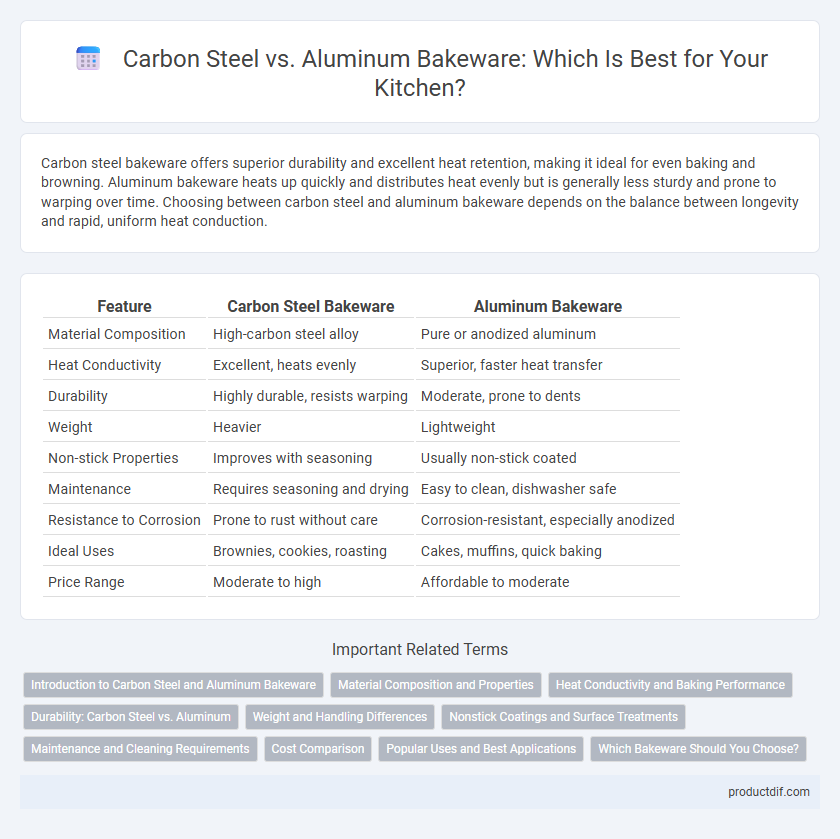Carbon steel bakeware offers superior durability and excellent heat retention, making it ideal for even baking and browning. Aluminum bakeware heats up quickly and distributes heat evenly but is generally less sturdy and prone to warping over time. Choosing between carbon steel and aluminum bakeware depends on the balance between longevity and rapid, uniform heat conduction.
Table of Comparison
| Feature | Carbon Steel Bakeware | Aluminum Bakeware |
|---|---|---|
| Material Composition | High-carbon steel alloy | Pure or anodized aluminum |
| Heat Conductivity | Excellent, heats evenly | Superior, faster heat transfer |
| Durability | Highly durable, resists warping | Moderate, prone to dents |
| Weight | Heavier | Lightweight |
| Non-stick Properties | Improves with seasoning | Usually non-stick coated |
| Maintenance | Requires seasoning and drying | Easy to clean, dishwasher safe |
| Resistance to Corrosion | Prone to rust without care | Corrosion-resistant, especially anodized |
| Ideal Uses | Brownies, cookies, roasting | Cakes, muffins, quick baking |
| Price Range | Moderate to high | Affordable to moderate |
Introduction to Carbon Steel and Aluminum Bakeware
Carbon steel bakeware offers superior heat conductivity and durability, making it ideal for achieving even browning and a crispy texture in baked goods. Aluminum bakeware is lightweight and provides excellent heat distribution, which helps in uniform cooking and quick temperature adjustments. Both materials are favored in professional and home kitchens for their distinct thermal properties and performance in various baking tasks.
Material Composition and Properties
Carbon steel bakeware features a dense, strong composition that provides excellent heat retention and even baking, while aluminum bakeware is lightweight and offers superior thermal conductivity for faster, more uniform heat distribution. The high carbon content in carbon steel makes it more durable and resistant to warping under high temperatures, whereas aluminum's softness and natural oxidation layer can lead to warping but also provides non-reactive, corrosion-resistant properties. These material characteristics directly impact baking performance, with carbon steel excelling in browning and crisping and aluminum favored for quick, consistent heat application.
Heat Conductivity and Baking Performance
Carbon steel bakeware offers superior heat conductivity compared to aluminum, ensuring even heat distribution and consistent baking results. Its durability allows for higher temperature tolerance, producing crispier crusts and more uniform browning. Aluminum bakeware heats quickly but may have hot spots, sometimes causing uneven baking and less precise temperature control.
Durability: Carbon Steel vs. Aluminum
Carbon steel bakeware offers superior durability due to its high strength and resistance to warping under high temperatures, making it ideal for long-term use. Aluminum bakeware is lightweight and conducts heat efficiently but is prone to denting and warping, reducing its lifespan. Choosing carbon steel ensures a more robust, wear-resistant option compared to aluminum's softer, less durable nature.
Weight and Handling Differences
Carbon steel bakeware is significantly heavier than aluminum, offering enhanced durability but requiring more effort to handle and maneuver. Aluminum bakeware is lightweight, promoting ease of use and quick handling, ideal for frequent baking tasks that demand swift placement and removal. The weight difference influences overall comfort and control, with carbon steel preferred for sturdier baking needs and aluminum favored for convenience and portability.
Nonstick Coatings and Surface Treatments
Carbon steel bakeware often features seasoned or nonstick coatings that enhance durability and promote even heat distribution, while aluminum bakeware typically uses anodized surfaces or Teflon-based nonstick layers for superior release and easy cleaning. The nonstick coatings on carbon steel tend to develop a natural patina with continued use, improving their performance over time without chemical wear. Aluminum's surface treatments provide excellent resistance to corrosion and scratches, maintaining consistent nonstick properties for lightweight, efficient baking.
Maintenance and Cleaning Requirements
Carbon steel bakeware requires seasoning to maintain its non-stick surface and prevent rust, necessitating hand washing with minimal soap and thorough drying after each use. Aluminum bakeware is naturally resistant to rust and easier to clean but can be prone to discoloration and may react with acidic foods, making gentle detergents and non-abrasive sponges ideal. Proper maintenance of carbon steel extends its lifespan, while aluminum's low-maintenance cleaning suits those seeking convenience in everyday baking.
Cost Comparison
Carbon steel bakeware generally costs more than aluminum bakeware due to its durability and heat retention properties. Aluminum bakeware is typically more budget-friendly and widely available, making it a popular choice for everyday baking needs. While carbon steel may require a higher upfront investment, its long-term performance can justify the initial expense for frequent bakers.
Popular Uses and Best Applications
Carbon steel bakeware excels in high-heat cooking and is ideal for searing, roasting, and baking crusty breads due to its excellent heat retention and durability. Aluminum bakeware, known for its lightweight and superior heat conduction, is preferred for baking cakes, cookies, and muffins where even heat distribution ensures uniform browning and soft textures. For professional or heavy-duty use, carbon steel offers long-lasting performance, while aluminum suits everyday baking tasks requiring quick and consistent heat response.
Which Bakeware Should You Choose?
Carbon steel bakeware offers superior heat retention and durability, making it ideal for recipes requiring consistent, high temperatures and a crisp finish. Aluminum bakeware provides excellent heat conductivity and lightweight ease, ensuring even baking and faster preheating, which suits everyday use and delicate baked goods. Choosing between the two depends on your cooking style: opt for carbon steel for heavy-duty tasks and aluminum for quick, even baking.
Carbon steel vs Aluminum bakeware Infographic

 productdif.com
productdif.com